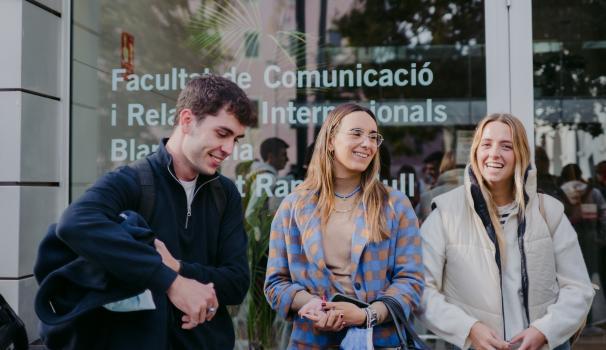Marketing
To give our brand a differentiated personality to stand out from the competition.
Enrolment open
8 a.m. to 2 p.m. / 11 a.m. to 6 p.m. / 3 p.m. to 9 p.m.
Blanquerna-URL - Plaça Joan Coromines. 08001 Barcelona
School of Communication and International Relations
Students with a passion for advertising, public relations and marketing, emerging and multidisciplinary sectors undergoing constant changes due to technological innovation and new forms of social and business communication.
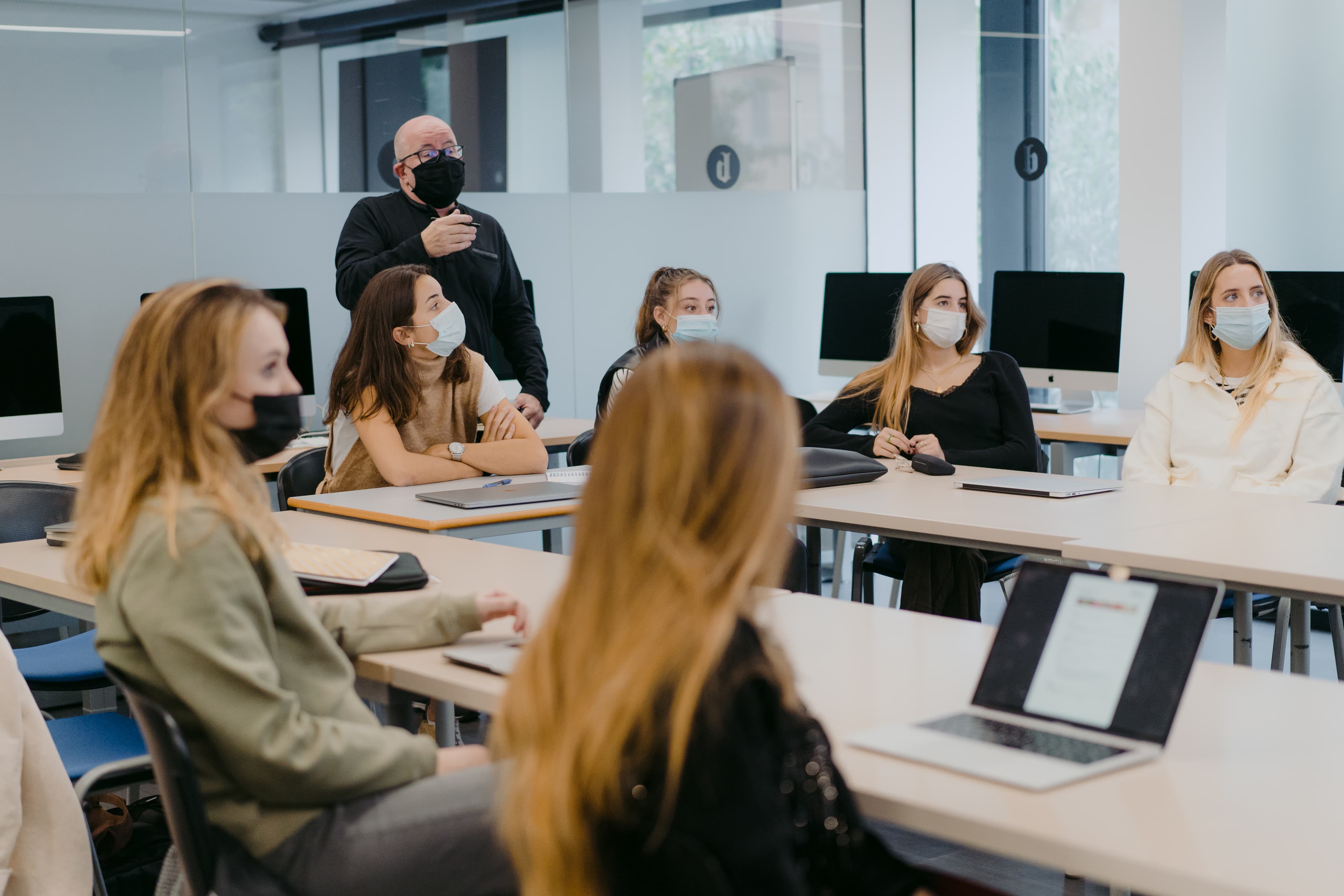
A guaranteed future career.
To give our brand a differentiated personality to stand out from the competition.
To give persuasive information about the brand.
To improve the brand's reputation among its audiences.
The studies of Advertising, Public Relations and Marketing offer 3 specialization itineraries:
intended for profiles that want to focus on creativity in the audio-visual field.
The most persuasive aspect of brand communication, especially in the digital field.
Linked to the reputational area of brands and corporations, with special emphasis on the digital world.
employment rate (specific data for bachelor's degree, according to AQU)
of graduates find work in less than a year (AQU)
the degree with the best Occupational Quality Index (AQU)
of graduates would choose Blanquerna (AQU) again
Grups reduïts de 12-14 alumnes que treballen d'una manera pràctica 6 hores per setmana amb un/a professor/a que a més tutoritza a cada alumne/a al llarg del semestre. Aprenentatge per projectes.
Conveni amb més de 1.200 empreses amb els diversos perfils del sector. L'alumnat té l'oportunitat d'estar fins a un any i mig fent pràctiques.
Adreçades al conjunt d'alumnes de cada curs aporten els coneixements i les competències dels diferents àmbits professionals i una base humanista de caràcter transversal.
Estudiar fora és una experiència vital. L'alumnat té l'oportunitat de participar en diversos programes d’estades, gràcies als convenis signats amb més de 60 universitats arreu del món.

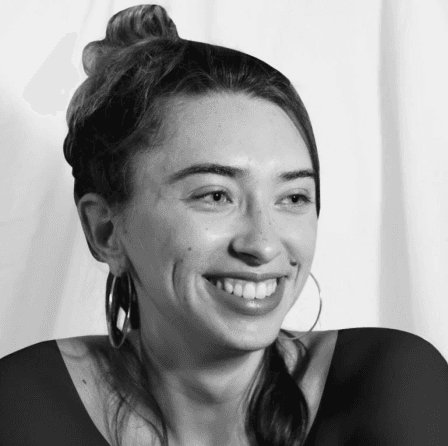
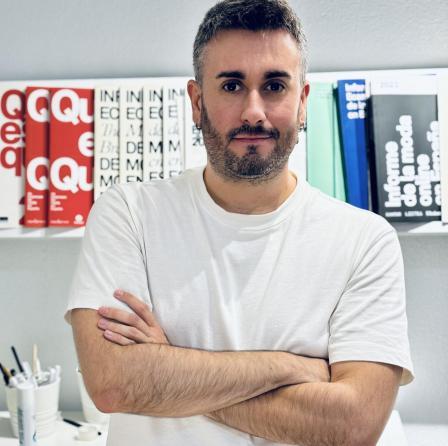
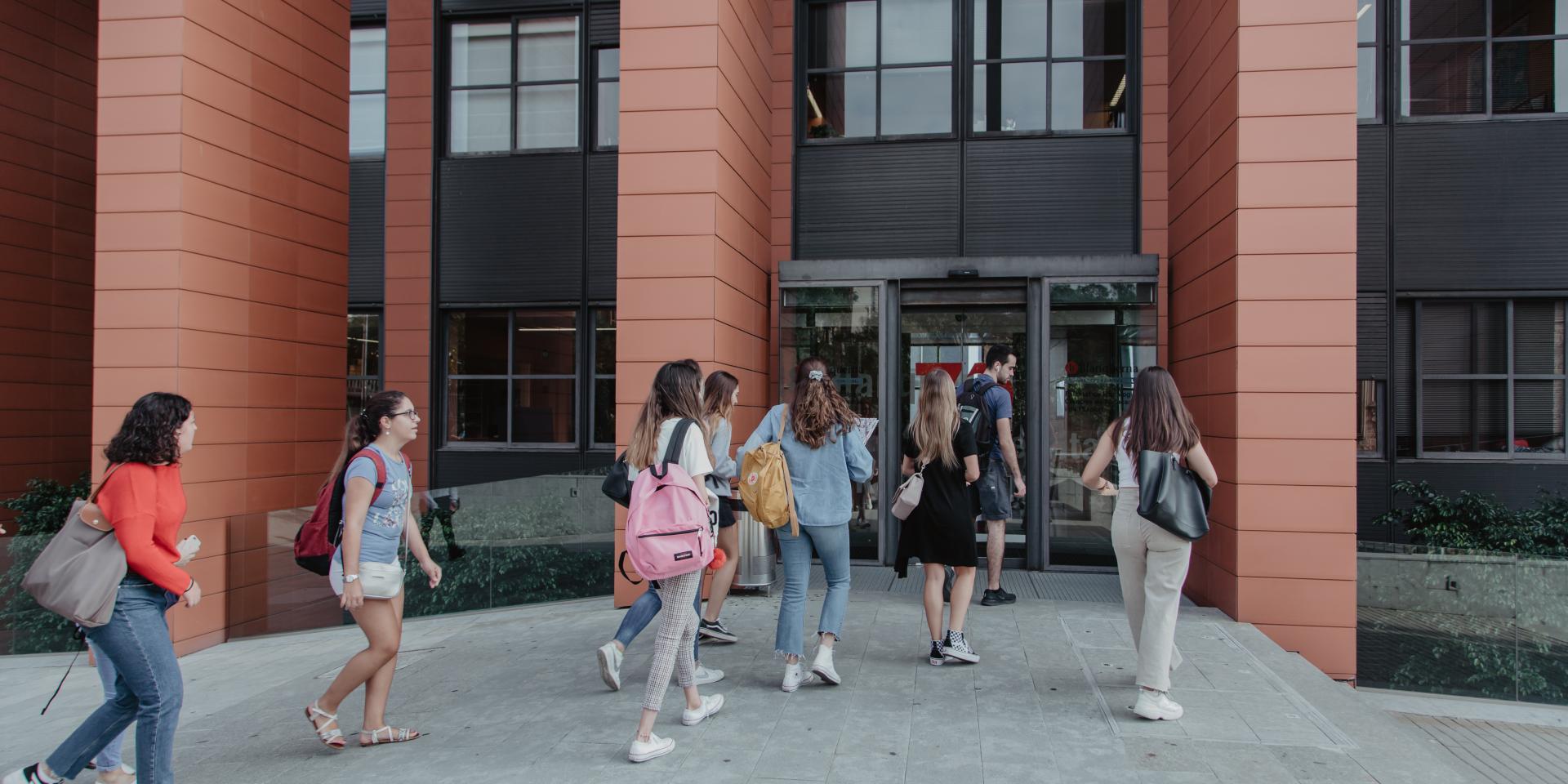
Study for two majors simultaneously, consecutively or following a track tailored to you
News

November 8, 2025
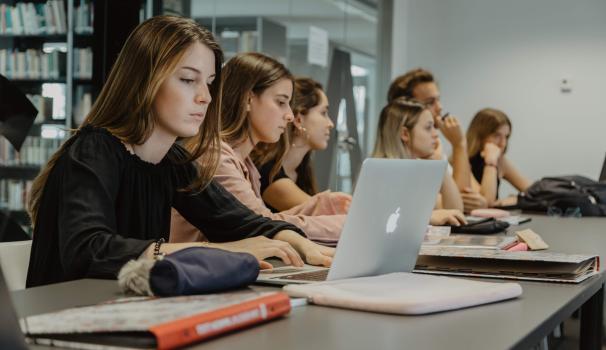
June 28, 2022
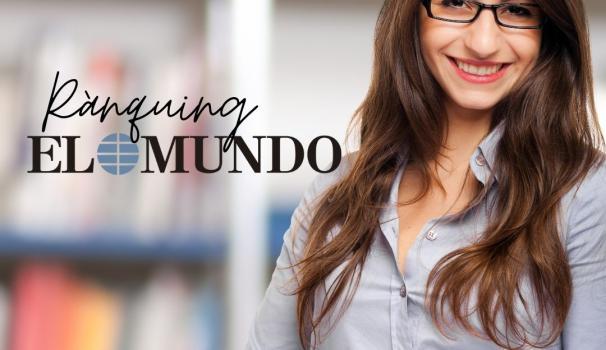
June 29, 2021
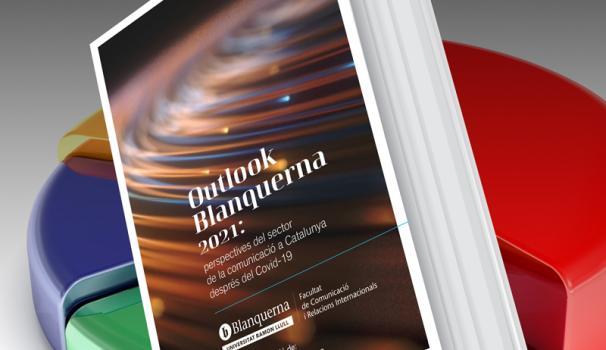
May 28, 2021
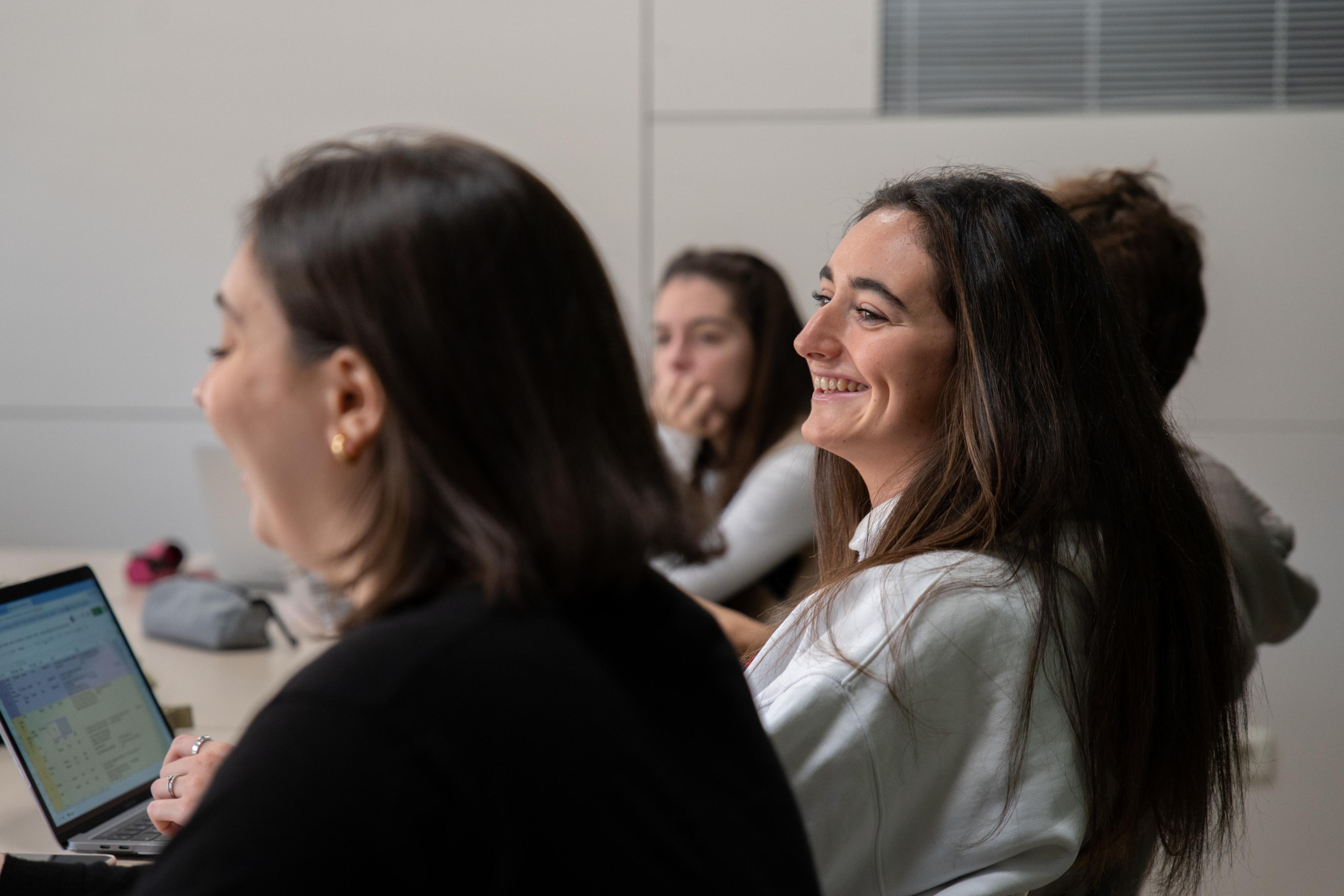
The Curriculum for the bachelor's degree in Advertising, Public Relations and Marketing is made up of basic, compulsory, and elective courses, internships, and a bachelor's thesis divided into 8 semesters (4 years) from September to May. Within this curriculum, you will be able to choose different specialization tracks according to the type of professional profile you want to develop. You can see it in detail below:
| First | Second | Third | Fourth | Total | |||
| Final degree project | 12 | 12 | |||||
| Core curriculum | 49 | 12 | 6 | 67 | |||
| Internships | 12 | 12 | |||||
| Compulsory | 11 | 48 | 42 | 30 | 131 | ||
| Optional | 6 | 12 | 18 | ||||
| Total | 60 | 60 | 60 | 60 | 240 |
| Subject | |||
| First semester | |||
| English 1 | 3 | Compulsory | |
| Seminar I. Introduction to Communication | 8 | Core curriculum | |
| Language I. Catalan Language | 3 | Core curriculum | |
| Language II. Spanish Language | 3 | Core curriculum | |
| Language and Techniques in Image and Sound | 5 | Compulsory | |
| Second semester | |||
| English 2 | 3 | Compulsory | |
| Seminar 2. Narration | 8 | Core curriculum | |
| Language III. Text Types | 3 | Core curriculum | |
| Theory of Communication and Information | 6 | Core curriculum | |
| Annual | |||
| Principles of Audiovisual Communication | 6 | Core curriculum | |
| Principles of Journalism and Corporate Communication | 6 | Core curriculum | |
| Principles of Advertising, Public Relations and Marketing | 6 | Core curriculum |
| Subject | |||
| Third semester | |||
| English 3 | 3 | Compulsory | |
| Seminar III: Professional Communication in Advertising, PR, and Marketing | 8 | Compulsory | |
| Contemporary Thought | 6 | Core curriculum | |
| General Sociology | 3 | Core curriculum | |
| Aesthetics | 4 | Compulsory | |
| Information Management | 3 | Compulsory | |
| Marketing I: Strategic and Operational Marketing | 3 | Compulsory | |
| Fourth semester | |||
| English 4 | 3 | Compulsory | |
| Seminar IV: Strategy, Creativity, and PR | 8 | Compulsory | |
| Sociology of Communication | 3 | Core curriculum | |
| Contemporary Political and Social History | 3 | Compulsory | |
| Introduction to Economy | 3 | Compulsory | |
| Digital Ecosystems | 3 | Compulsory | |
| Applied Graphic Design | 3 | Compulsory | |
| Techniques in Media Planning | 4 |
| Subject | |||
| Fifth semester | |||
| English V | 3 | Compulsory | |
| Seminar V: Creativity and Digital Strategy | 8 | Compulsory | |
| Communication Law | 4 | Compulsory | |
| Audiences and Markets | 3 | Compulsory | |
| Creativity and Conceptualization | 3 | Compulsory | |
| Strategic Planning: Planners | 3 | Compulsory | |
| Public Relations: Theory and Practice | 3 | Compulsory | |
| Specialization itinerary: Audiovisual Creativity | |||
| Art Direction | 3 | Optional | |
| Specialization itinerary: Advertising Strategy and Management | |||
| Art Direction | 3 | Optional | |
| Specialization itinerary: Public Relations Strategy and Management | |||
| Corporate Communication | 3 | Optional | |
| Sixth semester | |||
| Seminar VI: Brand Management and Creativity | 8 | Compulsory | |
| Market Research and Insights | 4 | Compulsory | |
| Marketing II: Advanced Marketing | 3 | Compulsory | |
| External Internships | 12 | Practicum | |
| Specialization itinerary: Audiovisual Creativity | |||
| Digital Content Strategy | 3 | Optional | |
| Specialization itinerary: Advertising Strategy and Management | |||
| Digital Content Strategy | 3 | Optional | |
| Specialization itinerary: Public Relations Strategy and Management | |||
| Digital Content Strategy | 3 | Optional |
| Subject | |||
| Seventh semester | |||
| English VI | 3 | Compulsory | |
| Seminar VII: Agency-Advertiser Role I | 8 | Compulsory | |
| Ethics of Communication I | 3 | Core curriculum | |
| Advertising Business | 4 | Compulsory | |
| Final Degree Project I | 6 | Final degree project | |
| Specialization itinerary: Audiovisual Creativity | |||
| Fundamentals of Script Writing | 3 | Optional | |
| Specialization itinerary: Advertising Strategy and Management | |||
| Digital Marketing | 3 | Optional | |
| Specialization itinerary: Public Relations Strategy and Management | |||
| Digital Marketing | 3 | Optional | |
| Free elective courses I | |||
| International Relations | 3 | Optional | |
| Religious Journalism | 3 | Optional | |
| Psychology of Communication | 3 | Optional | |
| Off-campus Internship | 6 | Optional | |
| Eighth semester | |||
| Seminar VIII: Agency-Advertiser Role II | 8 | Compulsory | |
| Ethics of Communication II | 3 | Core curriculum | |
| International Marketing | 4 | Compulsory | |
| Media: Strategy and Negotiation | 3 | Compulsory | |
| Final Degree Project II | 6 | Final degree project | |
| Specialization itinerary: Audiovisual Creativity | |||
| Creativity Techniques and Production Process | 3 | Optional | |
| Specialization itinerary: Advertising Strategy and Management | |||
| Creativity Techniques and Production Process | 3 | Optional | |
| en: Línia de text intercalada. Pendent d'edicióSpecialization itinerary: Public Relations Strategy and Management | |||
| Strategies in Public Relations | 3 | Optional | |
| Free elective courses II | |||
| History of Literature | 3 | Optional | |
| Cross-Cultural Communication | 3 | Optional | |
| Communication, Culture and Spirituality | 3 | Optional | |
| You must choose 6 credits from the free elective courses (I and II) |
| First | Second | Third | Fourth | Total | |||
| Final degree project | 12 | 12 | |||||
| Core curriculum | 43 | 18 | 6 | 67 | |||
| Internships | 12 | 12 | |||||
| Compulsory | 17 | 42 | 42 | 30 | 131 | ||
| Optional | 6 | 12 | 18 | ||||
| Total | 60 | 60 | 60 | 60 | 240 |
| Subject | Credits | Academic type | |
| First semester | |||
| English 1 | 3 | Compulsory | |
| Seminar I. Introduction to Communication | 8 | Core curriculum | |
| Language I. Catalan Language | 3 | Core curriculum | |
| Language II. Spanish Language | 3 | Core curriculum | |
| History of Contemporary Thought | 6 | Core curriculum | |
| General Sociology | 3 | Core curriculum | |
| Theory of Communication and Information | 6 | Core curriculum | |
| Second semester | |||
| English 2 | 3 | Compulsory | |
| Seminar 2. Narration | 8 | Core curriculum | |
| Language III. Text Types | 3 | Core curriculum | |
| Aesthetics | 4 | Compulsory | |
| Sociology of Communication | 3 | Core curriculum | |
| Information Management | 4 | Compulsory | |
| Language and Techniques in Image and Sound | 3 | Compulsory | |
| Subject | Credits | Academic type | |
| Third semester | |||
| English 3 | 3 | Compulsory | |
| Contemporary Political and Social History | 3 | Compulsory | |
| Seminar III. Professional Communication | 8 | Compulsory | |
| Introduction to Audiovisual Communication | 6 | Core curriculum | |
| Introduction to Journalism and Corporate Communication | 6 | Core curriculum | |
| Introduction to Advertising, PR and Marketing | 6 | Core curriculum | |
| Fourth semester | |||
| English 4 | 3 | Compulsory | |
| Audiences and Markets | 3 | Compulsory | |
| Introduction to Economy | 4 | Compulsory | |
| New Media | 3 | Compulsory | |
| Basic Principles in Design | 4 | Compulsory | |
| Seminar IV. Introduction to Advertising, PR and Marketing | 8 | Compulsory | |
| Fundamentals in Marketing | 3 | Compulsory | |
| Subject | Credits | Academic type | |
| Fifth semester | |||
| English V | 3 | Compulsory | |
| Communication Law | 4 | Compulsory | |
| Conceptualisation in Advertising and Public Relations | 3 | Compulsory | |
| Techniques in Media Planning | 3 | Compulsory | |
| Strategic Planning in Advertising and PR: the Planner | 3 | Compulsory | |
| Theory and Techniques in Public Relations | 3 | Compulsory | |
| Seminar V: Strategies in Communication I | 8 | Compulsory | |
| Specialization itinerary: Audiovisual Creativity | |||
| Art Direction | 3 | Optional | |
| Specialization itinerary: Advertising Strategy and Management | |||
| Art Direction | 3 | Optional | |
| Specialization itinerary: Public Relations Strategy and Management | |||
| Corporate Communication | 3 | Optional | |
| Sixth semester | |||
| Development of Projects | 4 | Compulsory | |
| Strategic and Operational Marketing | 3 | Compulsory | |
| External Internships | 12 | Practicum | |
| Seminar VI: Strategies in Communication II | 8 | Compulsory | |
| Specialization itinerary: Audiovisual Creativity | |||
| TV Editing | 3 | Optional | |
| Specialization itinerary: Advertising Strategy and Management | |||
| Digital Content Management | 3 | Optional | |
| Specialization itinerary: Public Relations Strategy and Management | |||
| Digital Content Management | 3 | Optional | |
| Subject | Credits | Academic type | |
| Seventh semester | |||
| English VI | 3 | Compulsory | |
| Ethics of Communication I | 3 | Core curriculum | |
| Free elective courses I | Optional | ||
| Religious Journalism | 3 | ||
| Off-campus Internship | 6 | ||
| Psychology of Communication | 3 | ||
| International Relations | 3 | ||
| Company Management in Advertising and PR. Business Management | 4 | Compulsory | |
| Seminar VII: Agency-Advertiser Role I | 8 | Compulsory | |
| Final Degree Project I | 6 | Final degree project | |
| Specialization itinerary: Audiovisual Creativity | |||
| Audiovisual Production | 3 | Optional | |
| Specialization itinerary: Advertising Strategy and Management | |||
| Digital Marketing | 3 | Optional | |
| Specialization itinerary: Public Relations Strategy and Management | |||
| Digital Marketing | 3 | Optional | |
| Eighth semester | |||
| Ethics of Communication II | 3 | Core curriculum | |
| Free elective courses II | 3 | Optional | |
| Cross-Cultural Communication | |||
| Communication, Culture and Spirituality | |||
| History of Literature | |||
| Strategy and Planning in Media | 3 | Compulsory | |
| International Marketing | 4 | Compulsory | |
| Seminar VIII: Agency-Advertiser Role II | 8 | Compulsory | |
| Final Degree Project II | 6 | Final degree project | |
| Specialization itinerary: Audiovisual Creativity | |||
| Creativity Techniques and Production Process | 3 | Optional | |
| Specialization itinerary: Advertising Strategy and Management | |||
| Creativity Techniques and Production Process | 3 | Optional | |
| Specialization itinerary: Public Relations Strategy and Management | |||
| Strategies in Public Relations | 3 | Optional | |
| You must choose 6 credits from the free elective courses (I and II) |
| Subject | Credits | Academic type | |
| Annual | |||
| Cinematographic direction | 4 | Compulsory | |
| Fundamentals of Script Writing | 3 | Compulsory | |
| Seminar V: Specialisation in Audiovisual I | 8 | Compulsory | |
| Audiovisual Production | 3 | Compulsory | |
| Seminar VII: Audiovisual Products and Formats I | 8 | Compulsory | |
| Structure of the Cinema Industry | 4 | Compulsory | |
| Trends and Criticism of Contemporary Cinema | 4 | Compulsory | |
| Final Degree Project I | 6 | Final degree project | |
| Seminar VI: Specialisation in Audiovisual II | 8 | Compulsory | |
| External Interships | 12 | Practicum | |
| TV Editing | 3 | Compulsory | |
| Applied Script | 3 | Compulsory | |
| Seminar VIII: Audiovisual Products and Formats II | 8 | Compulsory | |
| Final Degree Project II | 6 | Final degree project | |
| Structure of the TV Industry | 3 | Compulsory | |
| Narrative of Audiovisual Genres | 3 | Compulsory | |
| 3 | Compulsory | ||
| History of Cinema | 4 | Compulsory | |
| Track: Audiovisual Technology | |||
| In the event that you have studied the Audiovisual Creativity, Public Relations Strategy and Management track in the (GPUB) degree program | |||
| Audiovisual Genres and Formats | 3 | Optional | |
| Photo direction | 3 | Optional | |
| Sound Captation and Techniques | 3 | Optional | |
| Audiovisual Editing and Postproduction | 3 | Optional | |
| Track: Audiovisual Journalism | |||
| In the event that you have studied the Audiovisual Creativity, Public Relations Strategy and Management track in the (GPUB) degree program | |||
| Audiovisual Information | 3 | Optional | |
| Sound Captation and Techniques | 3 | Optional | |
| Audiovisual Genres and Formats | 3 | Optional | |
| In the event that you have studied the Audiovisual Creativity track in the (GPUB) degree program | |||
| Digital Content Management | 3 | Optional | |
| Audiovisual Information | 3 | Optional | |
| Sound Captation and Techniques | 3 | Optional | |
| Audiovisual Genres and Formats | 3 | ||
| Track: Audiovisual Marketing | |||
| In the event that you have studied the Advertisint Strategy and Management track in the (GPUB) degree program | |||
| Fundamentals in Marketing | 3 | Optional | |
| Audiences and Markets | 3 | Optional | |
| Corporate Identity and Culture | 3 | Optional | |
| In the event that you have studied the Public Relations Strategy and Management track in the (GPUB) degree program | |||
| Fundamentals in Marketing | 3 | Optional | |
| Audiences and Markets | 3 | Optional | |
| In the event that you have studied the Audiovisual Creativity track in the (GPUB) degree program | |||
| Corporate Identity and Culture | 3 | Optional | |
| Fundamentals in Marketing | 3 | Optional | |
| Digital Marketing | 3 | Optional | |
| Audiences and Markets | 3 | Optional |
| Subject | Credits | Academic type | |
| Annual | |||
| Audiovisual Genres and Formats | 3 | Compulsory | |
| Writing Genres and Formats | 3 | Compulsory | |
| Radio Genres and Formats | 3 | Compulsory | |
| Corporate Identity and Culture | 3 | Compulsory | |
| Seminar V. Skills and Competences for Production I | 8 | Compulsory | |
| Business and Structure of Communication | 4 | Compulsory | |
| Seminar VII. Specialized Information | 8 | Compulsory | |
| Final Degree Project I | 6 | Final degree project | |
| Seminar IV. Integral Management of Communication | 8 | Compulsory | |
| Theory and History of Journalism | 3 | Compulsory | |
| Digital Content Management | 3 | Optional | |
| Development of Projects | 3 | Compulsory | |
| Seminar VI. Skills and Competences for Production II | 8 | Compulsory | |
| External Internships | 12 | Practicum | |
| Reputation, Crisis Communication and CSR | 4 | Compulsory | |
| Seminar VIII. Public Relations and Press Office II | 8 | Compulsory | |
| Advanced Design | 4 | Compulsory | |
| Final Degree Project II | 6 | Final degree project | |
| **In the event that you have studied the Advertinsing Strategy and Management track, is not necessary to enroll in Digital Content Management | |||
| **In the event that you have studied the Public Relations Strategy and Management track, is not necessary to enroll in Corporate Communication and Digital Content Management | |||
| Track: Busines Communication | |||
| Track studied for (GPUB): Advertising strategy and Management | |||
| Strategies in Public Relations | 3 | Optional | |
| Track studied for (GPUB): Public Relations Strategy and Management | |||
| You do not have to enrol in any subject | |||
| Track studied for (GPUB): Audiovisual Creativity | |||
| Digital Marketing | 3 | Optional | |
| Strategies in Public Relations | 3 | Optional | |
| Track: Media | |||
| Track studied for (GPUB): Advertising strategy and Management | |||
| Audiovisual Information | 3 | Optional | |
| Radio Information | 3 | Optional | |
| Journalistic Investigation and Reporterism | 3 | Optional | |
| Photojournalism | 3 | Optional | |
| Track studied for (GPUB): Public Relations Strategy and Management | |||
| Audiovisual Information | 3 | Optional | |
| Radio Information | 3 | Optional | |
| Journalistic Investigation and Reporterism | 3 | Optional | |
| Photojournalism | 3 | Optional | |
| Track studied for (GPUB): Audiovisual Creativity | |||
| Audiovisual Information | 3 | Optional | |
| Radio Information | 3 | Optional | |
| Journalistic Investigation and Reporterism | 3 | Optional | |
| Photojournalism | 3 | Optional | |
| Track: Audiovisual Narrative | |||
| Track studied for (GPUB): Advertising strategy and Management | |||
| Audiovisual Information | 3 | Optional | |
| Photojournalism | 3 | Optional | |
| Fundamentals of Script Writing | 3 | Optional | |
| TV Editing | 3 | Optional | |
| Track studied for (GPUB): Public Relations Strategy and Management | |||
| Audiovisual Information | 3 | Optional | |
| Photojournalism | 3 | Optional | |
| Fundamentals of Script Writing | 3 | Optional | |
| TV Editing | 3 | Optional | |
| Track studied for (GPUB): Audiovisual Creativity | |||
| Audiovisual Information | 3 | Optional | |
| Photojournalism | 3 | Optional | |
| Fundamentals of Script Writing | 3 | Optional | |
| **Seminar IV will be studied under the instruction of an advisor |
Course fees are paid in installments without any interest. At the time of enrollment, 50% of the total cost of the credits for which the student is enrolled must be paid*; the remaining 50% is split into nine monthly installments (from October to June) payable by direct debit.
The tuition fee / credit of degrees is regularized each academic year for all courses.
Fundació Blanquerna discounts (not cumulative with each other):
In order to apply the discount, you must prove it with the corresponding document. Students must bring the original document in person to the Academic Secretariat, together with their identification document, for validation and application of the corresponding discount.
The deadline for submitting the supporting documentation for the 2026-2027 academic year is September 30, 2026.
We provide a broad knowledge base for our students which, together with internships, brings them closer to the professional world. In the changing world of persuasive communication, the high employability of our alumni is a guarantee of the studies received at Blanquerna-URL.
Managing relations with advertisers, coordinating the internal tasks of the agency to provide a service to the customer.

Creation of the idea, the concept, and its application from the written (copy) or visual (art) viewpoint.

Providing content related to the brand, via videos, texts or posters, depending on the network.

Delivering the advertiser's message to various audiences, by purchasing advertising space in conventional or digital media.
Creating, adapting or renewing a brand's personality through its positioning, purpose or values.

Applying tools and techniques to the digital environment, especially focusing on new forms of digital communication.

Creation of content by the brand, outside the usual advertising formats.

Product definition, communication and sales in a company's marketing department.

Product and corporate branding in a company's marketing department.

Managing the relationship between companies and the media, taking care of the brand's reputation.

As part of a company's corporate communication.
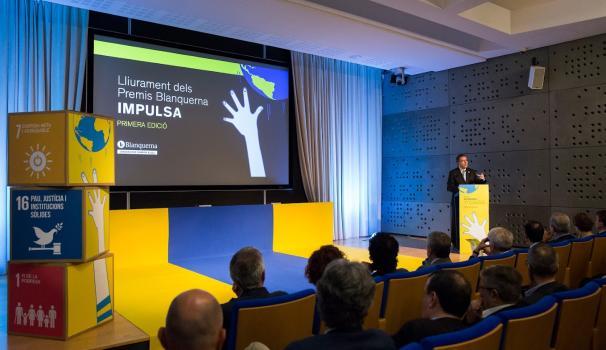
Designing, planning or producing conventions, congresses, festivals or other types of events.
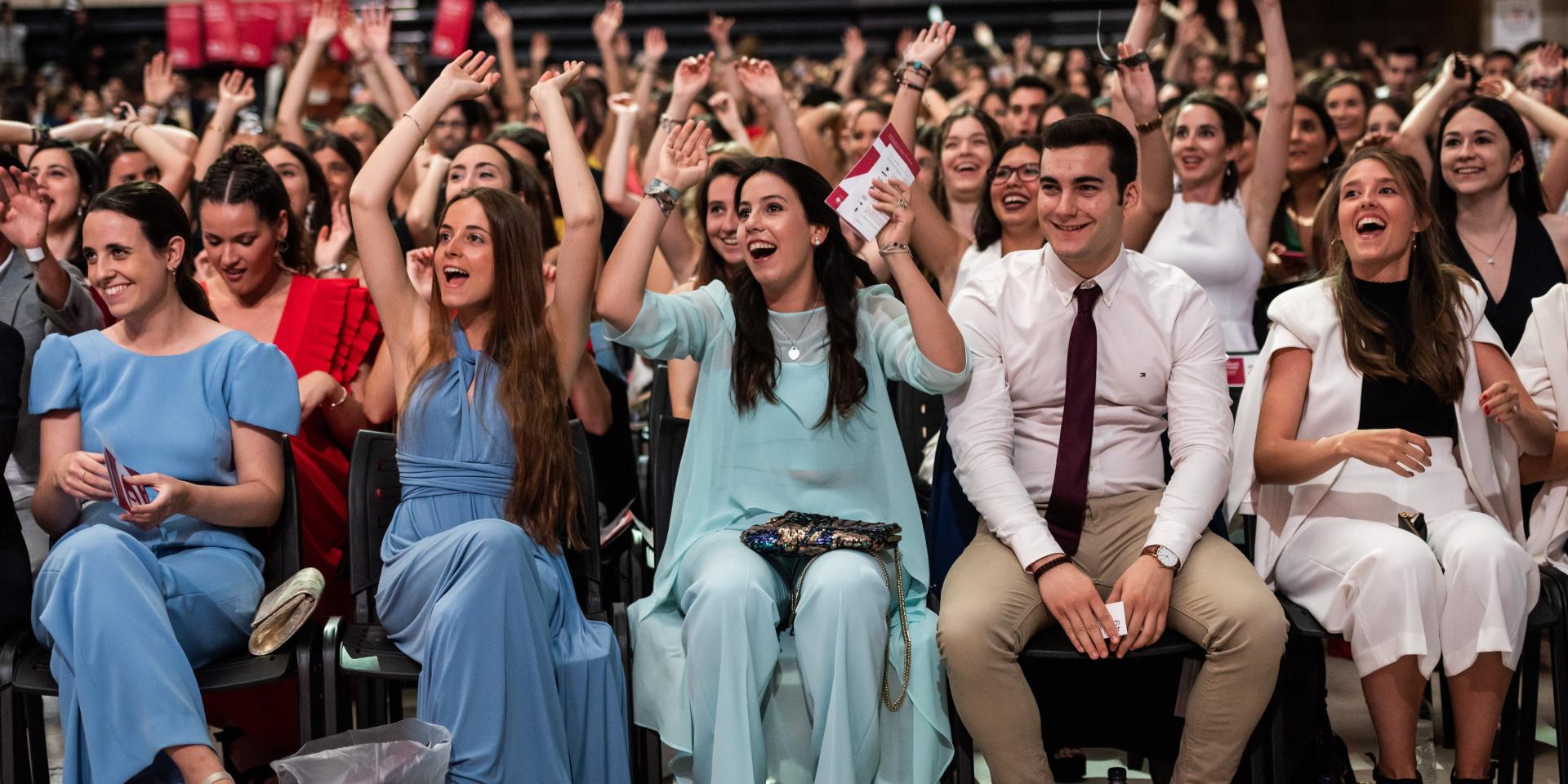
Our work doesn't finish the moment you graduate. The Alumni department will support you to enable us to achieve an employment rate of 90% of students in the first year after graduation
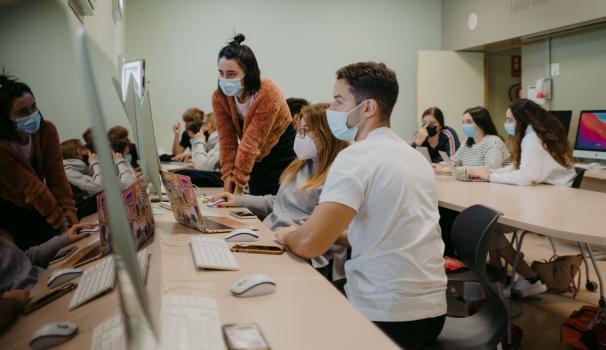
Let your imagination run wild and enter a space of boundless creativity, where you can work to find the best strategy and creative proposal for an advertising project.
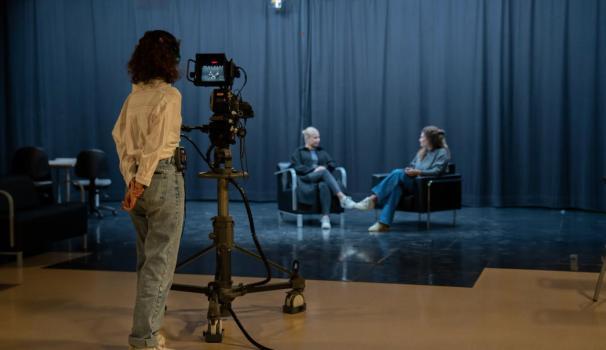
In front of or behind the camera? You can work on any of these skills in the school's two television studios. In addition to the cameras, you can learn how the production room, the lighting and the teleprompter work.
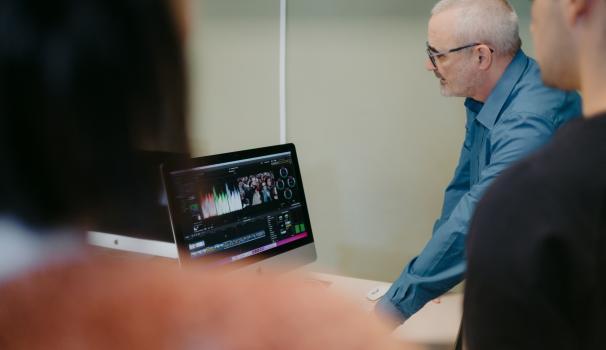
Available for both academic work and personal projects, you will find a total of 9 audio and video post-production rooms at the school, equipped with pioneering programs such as Photoshop, DaVinci Resolve, Final Cut Pro, Premiere Pro, After Effects and Audition.
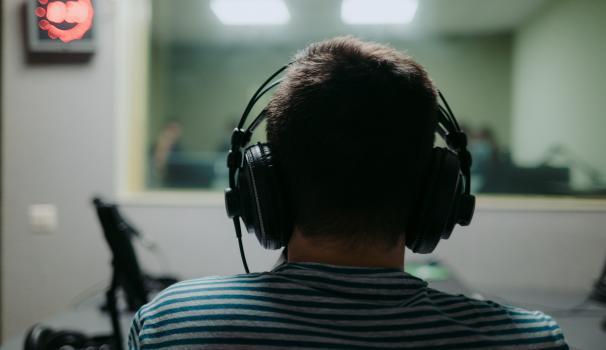
Whether it's broadcasting live or recording a podcast, you'll find all the equipment you need to do radio. The school has two radio studios and three individual workspaces equipped with microphones and telephones for external interviews.
For any communication project, the multimedia laboratory is the perfect room to start making a creative idea or initiative a reality. The room allows reservations for team meetings.
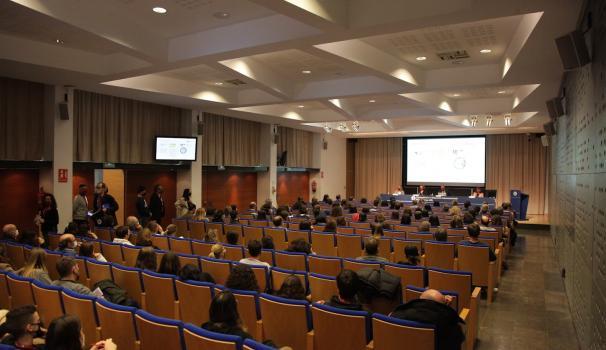
The school has an auditorium that can be used for celebrations, academic events, conferences or activities. In addition to the school's events, the space hosts other occasions that require ample space.
If you have a job or just need a computer, you can go to the computer classrooms or workspaces and use the Macs we have at your disposal.
Going into the world of work having been able to use professional equipment is essential. That's why we provide you with cameras that are used in the Audiovisual Communication and Journalism sectors so that you can learn with professional teams.
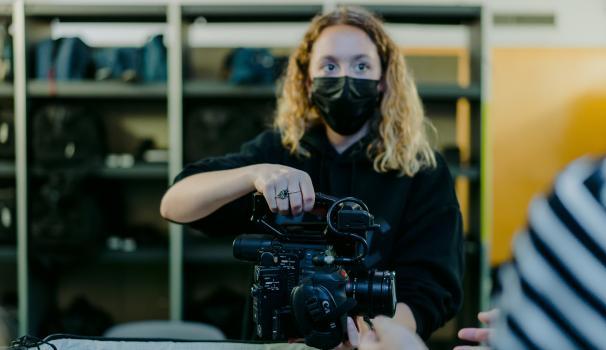
You have a wide range of accessories for professional cameras to get the best results in filming. Remember that you can use it for both personal and academic projects, always making the relevant reservation in advance.
If you need a quiet space to study or to do individual and group work, come to the library! Each school has its own library with computers, workrooms, reading points and an extensive catalog of documents you can consult in both hard copy and digital format.
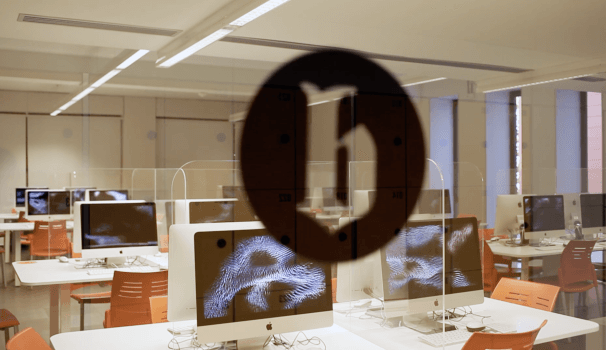
If you have a job or just need a computer, you can go to the computer classrooms or workspaces and use the Macs we have at your disposal.
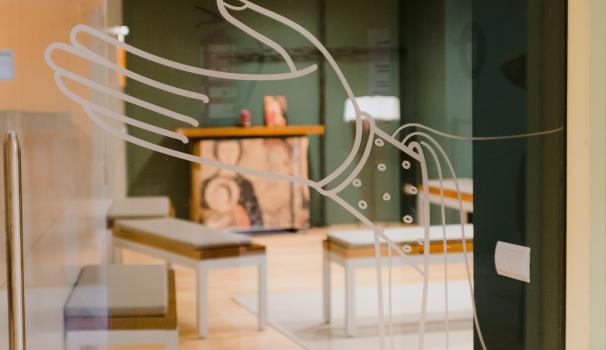
The chapel is the right place to find recollection, peace, to focus, to pray and to celebrate the Eucharist weekly and at important liturgical moments (Christmas, Ash Wednesday and Easter). The sacrament of reconciliation is also celebrated.

Using the latest equipment and audio-visual techniques is part of the learning process and enables students to enter the world of work with a broad knowledge of computer science. For this reason, the schools are equipped with audio-visual material for viewing and editing and a video library.
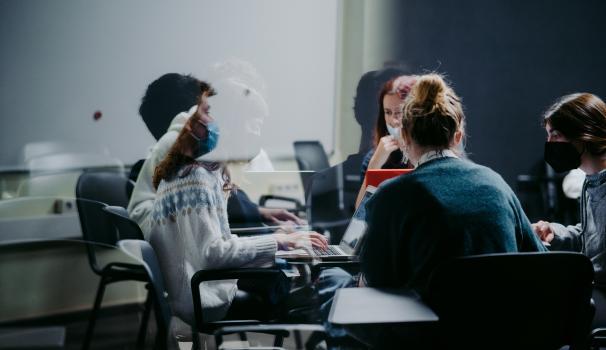
Ets estudiant o Alumni dels graus en Comunicació o del Grau en Relacions Internacionlals i tens un projecte que requereix equipament tecnològic i assessorament professional? Posem a la teva disposició el programa de mentoring, un servei per donar suport tecnològic i assessorament a aquests projectes.
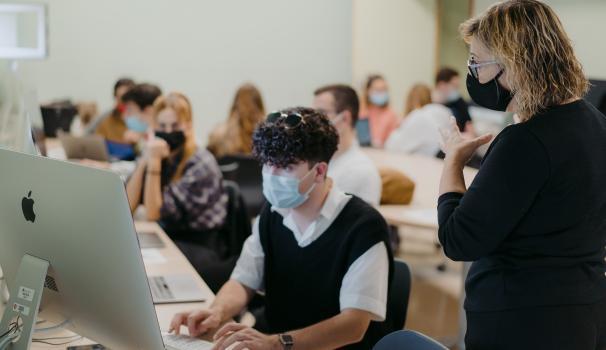
Our facilities include Mac computers, state-of-the-art software, WiFi network and printers to provide students with all the materials they need in their learning process.
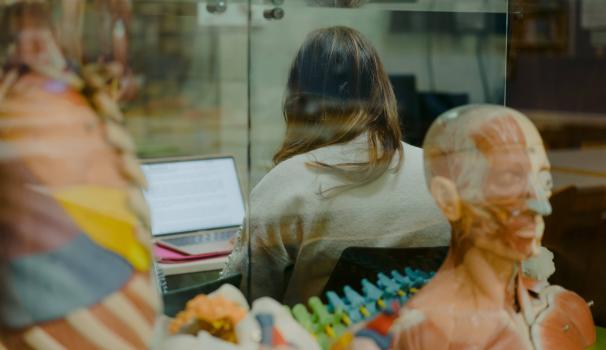
Ethics in the field of research is fundamental. The Faculty Research Institutes are supported by the opinions of the Research Ethics Committees (CER-URL) to evaluate and rate projects that have ethical implications.
If you are part of a research group, a professor or a PhD student and you need help with a project, you can ask for advice. This assistance includes analysis, guidance, help with applying for awards, and the financial management of projects.
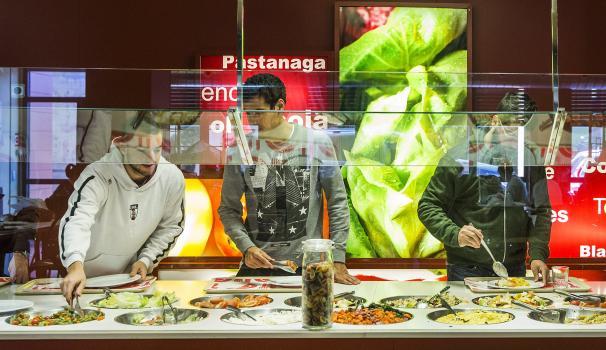
The nerve center of the quintessential faculties is the bar. There, teachers, students and staff meet throughout the day for breaks or meals.
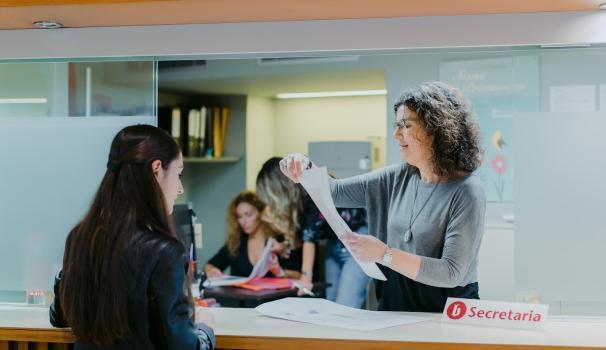
The Academic Secretaries of the Blanquerna faculties are the space for students to relate to the processes linked to the registration of official and own courses.

Would you like to receive information on pre-registration and admissions processes, scholarships and grants or validations? The SIOE is the service you need. Ask for all the information about any of these processes and discover all the possibilities at your fingertips.
Professional experience is a core part of our methodology. For this reason, we have a broad spectrum of internship agreements to meet the needs and preferences of all students. You will graduate having worked in your industry.

At Blanquerna, we put the future within everyone's reach thanks to our scholarships and grant service to start or continue studying at our schools. Financial aid is both internal and external to the university. You will find a wide range of possibilities.
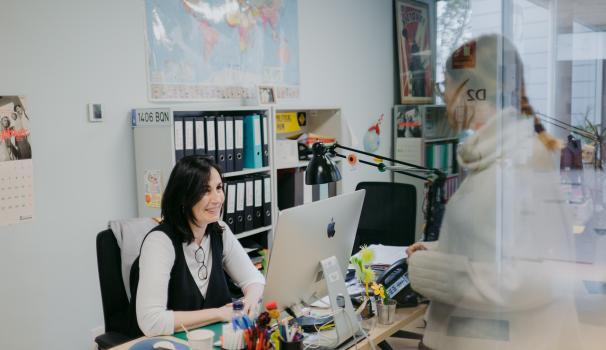
Going abroad is a unique opportunity to discover the plurality of the world. Aware of the importance of the internationalization of studies, we have established mobility agreements around the world.
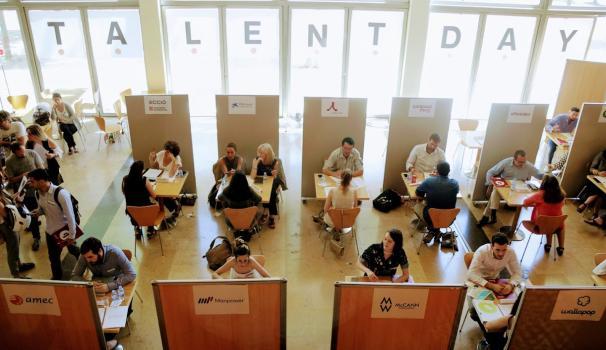
This service provides graduates with the necessary means so that they can actively participate in their professionalism and propose optimal candidates to organizations and companies looking for staff.

The leap into the world of work is always a challenge. For this reason, we provide a Job Bank for students and graduates. This service puts students in touch with companies and institutions looking for staff.
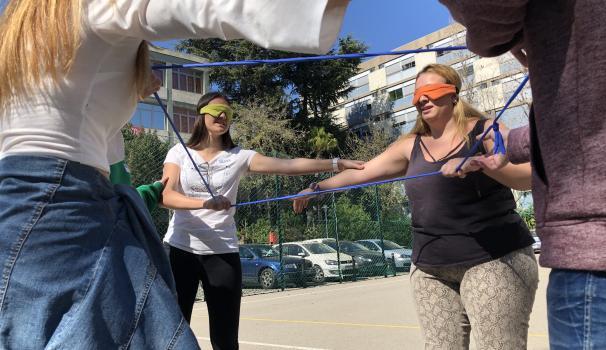
Solidarity and the struggle for human dignity are values that identify us. Solidarity Action is a volunteer program that our students can join to participate in projects in the Third and Fourth World.
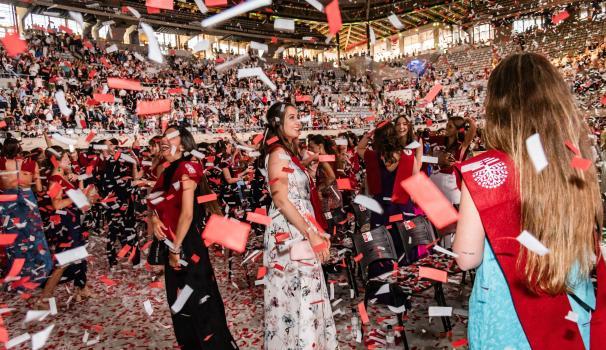
Studying in Blanquerna allows you to be part of our community. Being a college student opens the door to a lot of options for continuing your vocational training beyond your time in the classroom.
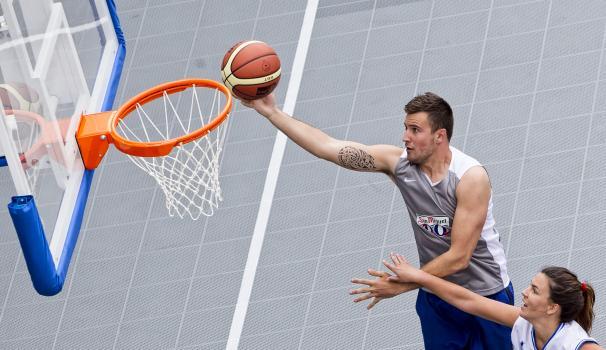
Want to represent the URL in college sports tournaments? You can find a wide range of possibilities for both individual and team sports. To be a student of Blanquerna, you will have a discount at the Can Caralleu and La Salle Sport & Fitness sports complexes.

If you are in a difficult situation in the academic, personal or social field, you can request, free of charge, the personalized attention of the SOP. This is an interdisciplinary team of professionals who will guide you in dealing with the situation.
In the three Blanquerna faculties, you will find spaces for reflection isolated from the hustle and bustle dedicated to the celebration of the Faith or cultural and religious animation. If you wish, you can also receive personalized attention and information about church life.
At Blanquerna we promote personal development at all levels to people with a diversity of specific needs from a normalizing context that encourages personal autonomy and uniqueness.
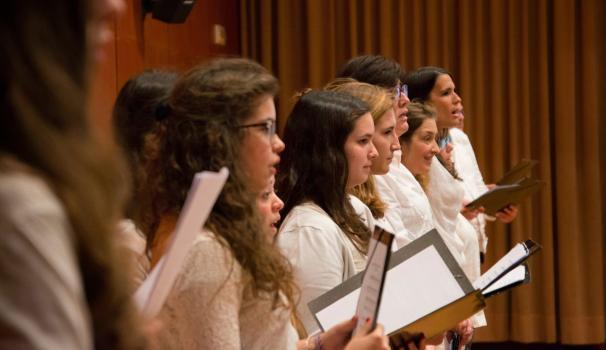
If you like music and want to take part in the concerts of institutional events and festivities, sign up for the Blanquerna Choir. There you will meet new friends and enjoy music.
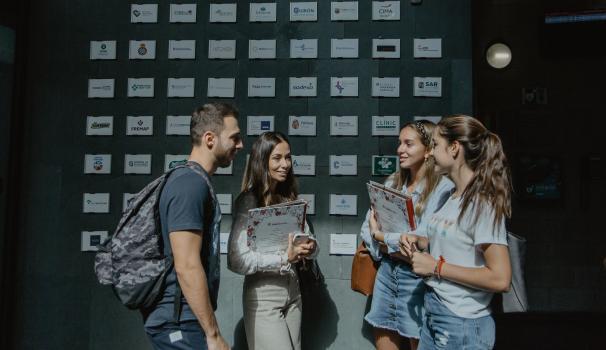
Each class group must elect a representative to put forward concerns or make proposals to the faculty members and academic management. At the same time, each degree must appoint a delegate and each school a representative on the general URL council.
Contact between students and the university is constant and is channeled through the Student Council, the body that collects proposals and requests from students and facilitates university life.

Are you studying a foreign language and want to improve your level? Do it at your own pace in the language self-learning classroom. This service offers various teaching resources and materials to practice the language.
Josep Maria Picola Meix
Aleksandra Krtolica Lukic
Marc Rosado Salvador
Eduard Vidal Portés
Cristian Marc Alegre Antón
Ester Almenar Taya
Lluís Anyó Sayol
Sue Aran Ramspott
Montserrat Arbós Figueras
Sonia Ballano Macías
Hugo Jordi Ballón Marco-Bach
Sandra Balsells Cubells
Pilar Baradat Marí
Serena Rachel Barkham
Jaume Benet Busquets
Alain G.F. Blomart
Ignasi Boada Sanmartín
Joan Bosch Garcia
Jordi Botey López
Josep Maria Brugues del Moral
Jordi Busquet Duran
Quim Calvo Vergés
Judith Calzada Duaigües
Francesc Canosa Farran
Juan Pablo Capilla Garcia
Joan Joaquim Carreras Goicoechea
Xavier Casals Meseguer
Jordi Collell López
Marc Compte Pujol
Juan Cuenca Fontbona
Andrea Daza Tapia
Sonia de Jaime Rodríguez
Rafael De Ribot Torrella
Núria Escalona Nicolas
Daniel Esparza Olivero
Roger Esteban Mondaray
Clàudia Esteruelas Sardó
Glynn James Euston
Joan Francesc Fondevila Gascón
Ramon Maria Fondevila Guinart
Salvador Garcia Arnillas
Uri Garcia Medalla
Jordi Garcia Soler
Iván Gómez García
Francesc Grané Terradas
Jonathan Green
Diane Hoyle
Ricardo Iscar Álvarez
Oriol Izquierdo Llopis
Juan Ramón La Parra Martínez
Maria Teresa Luis Compte
Juan Ignacio Marcet Gisbert
Marta Marín Anglada
Oriol Massegú Blanch
Judit Mata Monforte
Alfonso Medina Cambrón
Mònica Mestanza Garcia
Ramon Millà Bruch
Esteve Miralles Torner
Carlos Monte Salvador
David Morales Amorós
Gemma Morató Sendra
Bartolomé José Moya Olives
Jacint Niqui Espinosa
Anna Maria Nogué Regàs
Tracey Owen
Lluís Pastor Pérez
Susana Pérez Soler
Jaume Peris Llimona
Ronald Wayne Pfeil Stackpoole
Marta Piñol Querol
Patricia Plaja Pérez
Marcos Polo López
James William Pownall Graumann
Jaume Radigales Babí
Alba Ramírez Pagès
Carles Riera Fonts
Marc Roig Badia
Alba Sabaté Gauxachs
Joan Sabaté Salazar
Ferran Sáez Mateu
Sílvia Sáez Sánchez
Josep Sala Colom
Aníbal Salazar Anglada
Jordi Sànchez Torrents
Eva Santana López
David Serrano Blanquer
Antonio Solanilla Ruiz
David Tetilla Llaó
Joan Tharrats Pascual
Francesc Torralba Roselló
Xavier Vega Esquerra
Francesc Jesús Viadel Girbés
Sandra Vilajoana Alejandre
Francesc Vilallonga Montaña
Jennifer Weiss
Ursula Frances Wolf
Enric Xicoy Comas
Elena Yeste Piquer
Klaus Zilles
La Facultat de Comunicació i Relacions Internacionals Blanquerna-URL, conscient de la dimensió europea dels estudis que ofereix, ha presentat diversos projectes en l’àmbit de la internacionalització des del curs 1997-1998, que inclouen els programes de mobilitat d’estudiants de quart curs dels graus de Comunicació i Global Communication Management, i de tercer curs de Relacions Internacionals, i el programa d’intercanvi de professors i personal administratiu.
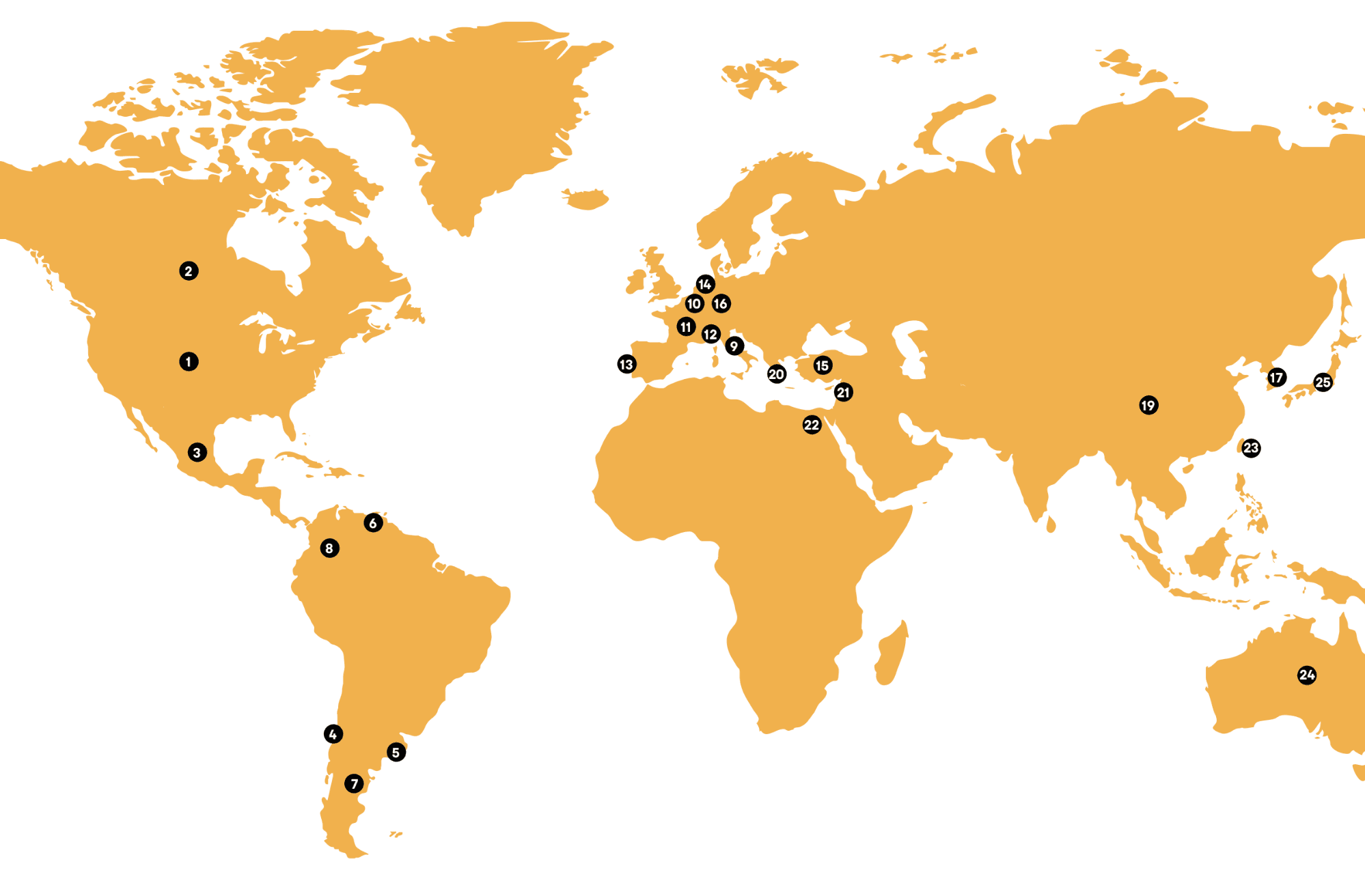
Université du Québec à Montréal
The application process for a place in the 2026-2027 academic year begins on October 29, 2025, and consists of three phases:
The application for a place can be made online or in person and entitles the applicant to participate in the admission process.
It can be done via the Application for admission button on the page for each degree, or directly from here, and requires:
It can be done at the School itself, by going to the Student Information and Guidance Service (SIOE), and the following must be submitted:
Approximately within two working days after the place application, the student will be informed by email about their admission. If admitted, the same message will invite them to formalize enrollment, including instructions on when and how to complete the procedure.
The criterion used to call admitted students to formalize enrollment will be the order of payment of the place application. For degrees with more than one shift, note that a shift may fill up during the enrollment period. The place will be definitive once the student has submitted the documentation with the final university entrance information and the first enrollment payment has been made.
For degrees taught in English, students must demonstrate a minimum B2 level of English to be admitted. The level can be accredited through the level test that all degree students must take before starting their program. To prove the minimum level, an official language certificate of B2 or higher can also be submitted: IELTS (6-7), TOEFL (IBT 90-110), CAMBRIDGE, or Official Language Schools, obtained within the last two years. Certificates from other organizations will not be accepted. The certificate does not exempt students from taking the level test to determine the English level for the first year.
It is the student's responsibility to have a level equivalent to B2 in the language of instruction of the degree to properly follow classes
The student called to enroll may choose between two options, depending on whether they already have the definitive entrance pathway or not.
Enrollment in the degree can be formalized before passing the PAU (University Entrance Exams) or CFGS or having the entrance pathway. Enrollment will be conditional on the presentation of the corresponding admission pathway. This option secures the place and allows choosing the shift, in the case of degrees with more than one shift, while places are available.
If the student does not obtain the entrance pathway, the enrollment fee will be refunded, but they will lose the place, preference in shift selection, and the amount paid for the place application (€50). If places remain available in July, they may choose to stay on the waiting list until September, and the money will be held, but they will no longer have preference for shift selection. If they do not obtain the entrance pathway by September, the enrollment fee paid will be refunded.
It will be formalized if, at the time of processing the enrollment, the student already has the university entrance pathway. They may opt for the available places and shifts.
IMPORTANT: Degrees with more than one shift may exhaust places in a specific schedule with conditional enrollment. The required documentation must be uploaded via the Document Repository.
The place will be definitive once the student has submitted the documentation with the final university entrance information and the first enrollment payment has been made.
NOTE: Students in the Communication Degrees must take an English level test that will not be exclusionary for admission but will determine the level at which they start the first year. Each student will be informed of the test date and time by email.
Studies can be paid upfront and/or in interest-free installments. If payment by installment is selected, upon enrollment the student will have two business days to pay 50% of the total cost of the enrolled credits, using their chosen form of payment; this payment will not be taken by direct debit. The remaining 50% will be divided into nine monthly payments from October to June via bank direct debit from the account provided at the time of enrollment. Prices for each academic year are updated annually.
Once payment is made, the corresponding receipt of enrollment can be viewed in the student's Document Repository and via the student's portal.
For the foreign student admission process, the following considerations and requirements must be taken into account in accordance with the prevailing regulations.
Students must apply to the Universidad Nacional de Educación a Distancia (UNED) to obtain the credential certifying that they meet the requirements to access university studies within the state education system (UNED Credential). Therefore, they do not need to take the PAU (University Entrance Exams), but without the mentioned credential, they cannot enroll in our degrees.
The education systems that can be accessed through this pathway are: Germany, Andorra, Austria, European Schools (European baccalaureate), International Baccalaureate, Belgium, Bulgaria, Croatia, Denmark, Slovakia, Slovenia, Estonia, Finland, France, Greece, Hungary, Ireland, Iceland, Italy, Latvia, Liechtenstein, Lithuania, Luxembourg, Malta, Norway, the Netherlands, Poland, Portugal, the United Kingdom, the Czech Republic, Romania, Sweden, Switzerland, China and Cyprus.
These students may access our degrees by submitting the homologation of the High School diploma from the Spanish Ministry of Education or from the autonomous communities with transferred competence, such as the Generalitat de Catalunya. Proof of application for convalidation will be sufficient for students to enroll and begin taking a bachelor's degree course, however full enrollment is conditional on convalidation being confirmed. Bear in mind that convalidating studies can take more than three months to complete, so this process should be done in parallel with the admissions process to our bachelor's degrees. If the convalidation resolution is not obtained in the terms requested by the interested party, the results of any exams taken, or the enrollment made as a result thereof, are rendered null and void.
For any questions or inquiries about the place application or enrollment process, contact [email protected]
The bachelor's thesis, which the student works on during the final year of the bachelor's degree, is a group project planned and executed with the same standards of excellence as any professional project within the world of advertising and public relations. With the curriculum development culminating in the bachelor's thesis, our students are ready to work on any area of the industry.
The thesis is written during the fourth academic year and has its own seminar. The student decides the topic and type of thesis. To write the thesis, the student can decide to do a research project or design an intervention program that will be tutored throughout the academic year by a professor-tutor specializing in that area.
The topics may be related to any of the areas of the profession and, where applicable, may also be linked to the center where the student is doing the internship or to the School's research groups.
The work will be conducted individually. Projects must be written in Catalan, Spanish, or English. In any case, the work will have to include a summary in English, Catalan, and Spanish.
There will be three grading systems and assessment times:
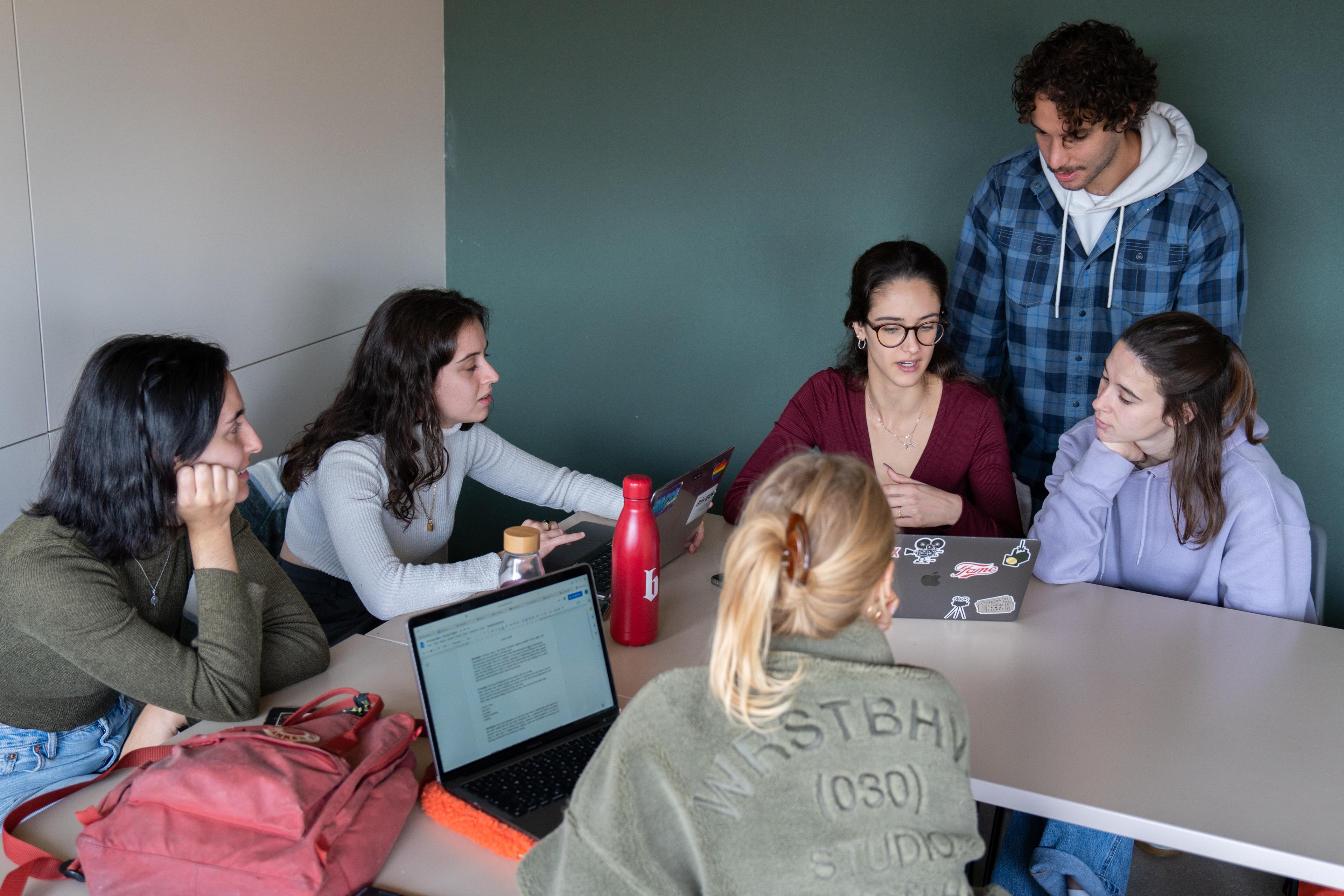
Find the help that best suits your needs between Blanquerna scholarships and grants, public and private grants or funding grants.
Blanquerna-URL is waiting for you!
External internships at companies and institutions are a key part of the learning process. They represent the student's initial direct contact with the professional world where they will be able to apply the knowledge gained at university. Internships provide the student with an overview of the communication and operating dynamics of the medium, company, or institution where they are receiving work experience. The School has agreements with upwards of 1,200 companies where students are prepared to face the working world.
21 Buttons · Absolute Events · Allsisters · Alqvimia · Ananta · Ap2u · Arena Media · ASPID · At comunicación · Avellaneda · Barcelona Activa · Barcelona Deluxe (Vip Media Press) · Barcelona Fashion Press · BBDO Proximity · BCN Actors (Castings Creativos) · Benecé · Berepublic Blogs Family · Berta Models · Bestours · Both People & Comms · Broadcater · BST · Bubblegum Health · BUM (Blasi Urgell i Morales) · Burson - Marsteller, SL · Caixa d'Estalvis i Pensions de Barcelona · Can Travi · Carat España · Carrots Capgròs Comunicación · Casa Asia · CCCB · Click consulting · Clinic Point · CM Group · Cocunat · Codorniu Raventós · Common Sense · Concept Agency · Contraseña Produccions, SL · Convoca · Coreevo · Cósmico Tv · Creative Zoo · DAMM · DDB · Dentsu Aegis · Disseny Barcelona · DKV Seguros · Dogmamoda · Dorna Sports · DreiBlau · Editorial Planeta · EF Education First · El Guateque · Elena Hernández Comunicación · Elite Spain · Elrow family · Equipo Singular · Esteoeste El càtering de la comunicación · estudi Ferran Sendra · Euro Briefing · Euroleague Basketball · Externa Imatge i Comunicació, S.L. · Felices · Ferrocarrils de la Generalitat de Catalunya · Filloy Comunicación · First Lego League · Focus Soluciones · Focus Soluciones · Fossil · Fun Providers · Gic · Glo Think · Globally (Newlink) · Grayskull · Haiku Media · Hands On · Havas Media · HKStrategies · Hospital Sant Joan de Déu · Hospital Universitari Vall d’Hebron · Hunter & Gatti · Icono Azul · Ideas de Comunicación y Relaciones Públicas · Ignatius · IKI Media · Innova Marketing · Innuo · Interactiva Promo Online · Interprofit · It Comunicacion (Worth It) · Jardiland · Jirada · K Factor (FMRG) · Kademe Solutions · Kibuk · Komodo Comunicación · La Central · La Vanguardia Ediciones · Labrand Psicología de Marcas · Lamarca · Lateral Thinking · LeCoq Sportif · Lewis Communications · Line Sports and Entertainment · Live Nation · Llorente y Cuenca · Malabars · Manatis · Manifiesto · Marco Comunicación · Maria Barcelona · Mariona Gea · MB Marketing · McCann Health · Mediacom Iberia · Mediàtic · MedWinds · Morillas · Moviment Lliures · MUT Marketing · Natura Bissé International · Nice Mondays · NissanUnited · Nivoria · Nutrim · Ogilvy · Ogilvy Ohmm · Olivia Events · One to One · Onza Comunicación · Optievents · Ormo Group · Otaduy · P.A.U. Education · Panaderías 365 · Pati Núñez Agency · Pequeñas grandes cosas · Pica Prica Press · Poble Espanyol · Pranarom · Pro Agency · Proximia Havas · Proximma · Publicitarios Implicados · Puente Aéreo · Punta Alta · PWC · Random House Mondadori · Re-construye Work · Reebok · Refruiting · Rocketroi · Roll’eat · Runrooom · Saatchi & Saatchi Healthcare · Sanofi · Sarao Barcelona · Scacs · Seat · Shackleton · Sistemas Ikanguro · Skate Agora · Smartrooms Company · Snoop Barcelona · Sogues Comunicación · Solsona Comunicación · SOM · Starcom Mediavest Group · Suma Thinking Digital · Talkcom · TBWA · Tesubi · The Hunter · The Love Comes · Time Out · Tinkle, SL · Touchpoint · Town · Traveely · Treatwell · Treehouse · UGT · Ulled & Asociados C.R.P. · Unilever España · Universal McCann · Uno Models · V3rtice · Vainilla · Veritas Media · Via Families · Vice · Visión Consultancy · VMLY&R · Wallapop · Weber Shandwick (Constituency Management Group Ibérica) · White Line Showroom · Wunderman Thompson · XXL Comunicación · You & Me Marketing · Zatro · Zenith Media · ZOOM
There are two types of external internships: curricular and extracurricular.
Curricular internships are those that form part of our curriculum: these are compulsory internships that are taken in parallel to seminar VI during the second semester of third year and the elective ones taken during the first semester of fourth year. The seminar VI professor is the advisor who will supervise the evolution of the student in their internships and guide them throughout the process. In the fourth year elective courses, the internship coordinator will appoint a faculty member to conduct a follow-up of the student. In the company, students will also have an advisor appointed by the center who will supervise their learning.
Extracurricular internships are all others that the student can do electively outside the curriculum, although they also have an exclusively training and teaching purpose and will therefore be included in the European Diploma Supplement (EDS). In all cases, the internship must be compatible with the student's class hours. Internships may or may not be remunerated, depending on the company or institution.
In the following links you will find the program of the curricular internships.
Students also have the opportunity to do internships abroad through different agreements with companies via programs such as Erasmus+.
The curricular and extracurricular internships are regulated by point 17 of the school's academic regulations.
The student's advisor in the school will provide students with the criteria to follow to successfully pass the internship course and the parameters for drawing up the internship report. Here is the guide to writing the report.
This must be done by contacting the School's Internship Service.
Degree follow-up reports
Center follow-up report
Student surveys
Faculty surveys (research and teaching staff)
Administrative and service staff surveys
Evidence relating to employer satisfaction
Job bank and careers
URL Student mobility
As the European Union points out, gender equality is not only a matter of social justice but also affects the results of teaching and research. Promoting gender equality in research and innovation is one of the European Commission's commitments, and it supports the explicit integration of a gender perspective in Horizon 2020 projects. However, this recommendation is often poorly understood and misapplied. Various documents are presented here with a view to contributing to a better understanding and application of the gender perspective in teaching and research.
RELATED PROGRAMS
We equip you for change


